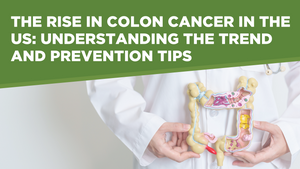The Rise in Colon Cancer in the US: Understanding the Trend and Prevention Tips
Feb 05, 2024
In recent years, the United States has seen a concerning uptick in colon cancer rates, particularly among younger adults. This trend has spurred a nationwide conversation on the importance of early detection, lifestyle changes, and dietary interventions to combat this life-threatening disease.
Understanding the Rise in Colon Cancer
Colon cancer, also known as colorectal cancer, affects the colon or rectum and is one of the leading causes of cancer-related deaths in the United States. Traditionally seen in older adults, recent statistics show a sharp increase in incidence among individuals under 50. This shift has puzzled medical experts and researchers, leading to intensified studies on lifestyle, diet, and environmental factors contributing to the rise.
For example, Siegel et al. (2017) found that colon cancer incidence rates increased annually by 1.0% to 2.4% since the mid-1980s in adults aged 20 to 39 years and by 0.5% to 1.3% since the mid-1990s in adults aged 40 to 54 years. Rectal cancer incidence rates have increased more rapidly, with a 3.2% annual increase from 1974–2013 in adults aged 20–29 years (Siegel et al., 2017)
Factors Contributing to the Increase
Several factors have been identified as potential contributors to the rising rates of colon cancer, including:
- Dietary Habits: Diets high in red and processed meats, low in fiber, fruits, and vegetables have been linked to an increased risk of colon cancer.
- Sedentary Lifestyle: Lack of physical activity is another risk factor, as it can lead to obesity, which is a known risk factor for colon cancer.
- Genetic Predisposition: Family history and genetic syndromes can increase the risk, making early screening crucial for those at higher risk.
- Environmental Factors: Exposure to certain chemicals and pollutants has also been suggested as a potential contributor to rising cancer rates.
Prevention Tips
Prevention plays a crucial role in combating the rise in colon cancer. Here are some actionable tips to consider:
- Dietary Changes: Incorporating a diet rich in fiber, fruits, vegetables, and whole grains while reducing the intake of red and processed meats can significantly lower the risk. Adults are recommended to consume 25 to 30 grams of fiber per day, depending on individual circumstances, age, and sex.
- Regular Exercise: Maintaining a healthy weight through regular physical activity can reduce the risk of colon cancer. Even 20 minutes of walking counts!
- Early Screening: Early detection through screenings like colonoscopies can save lives, particularly for those over 45 or with a family history of the disease.
- Avoiding Tobacco and Limiting Alcohol: Smoking and excessive alcohol consumption are known risk factors for colon cancer and should be avoided.

